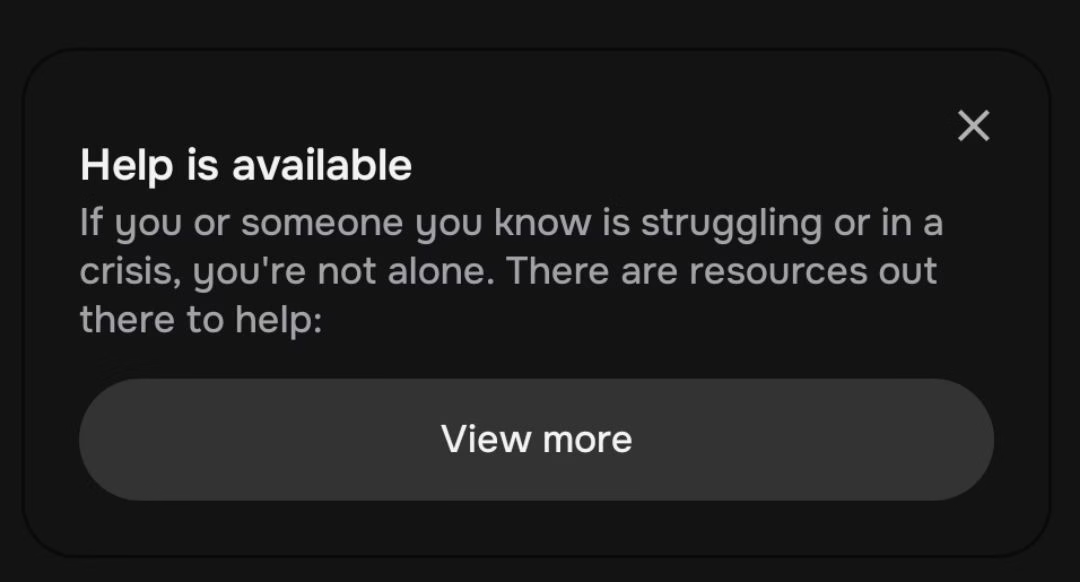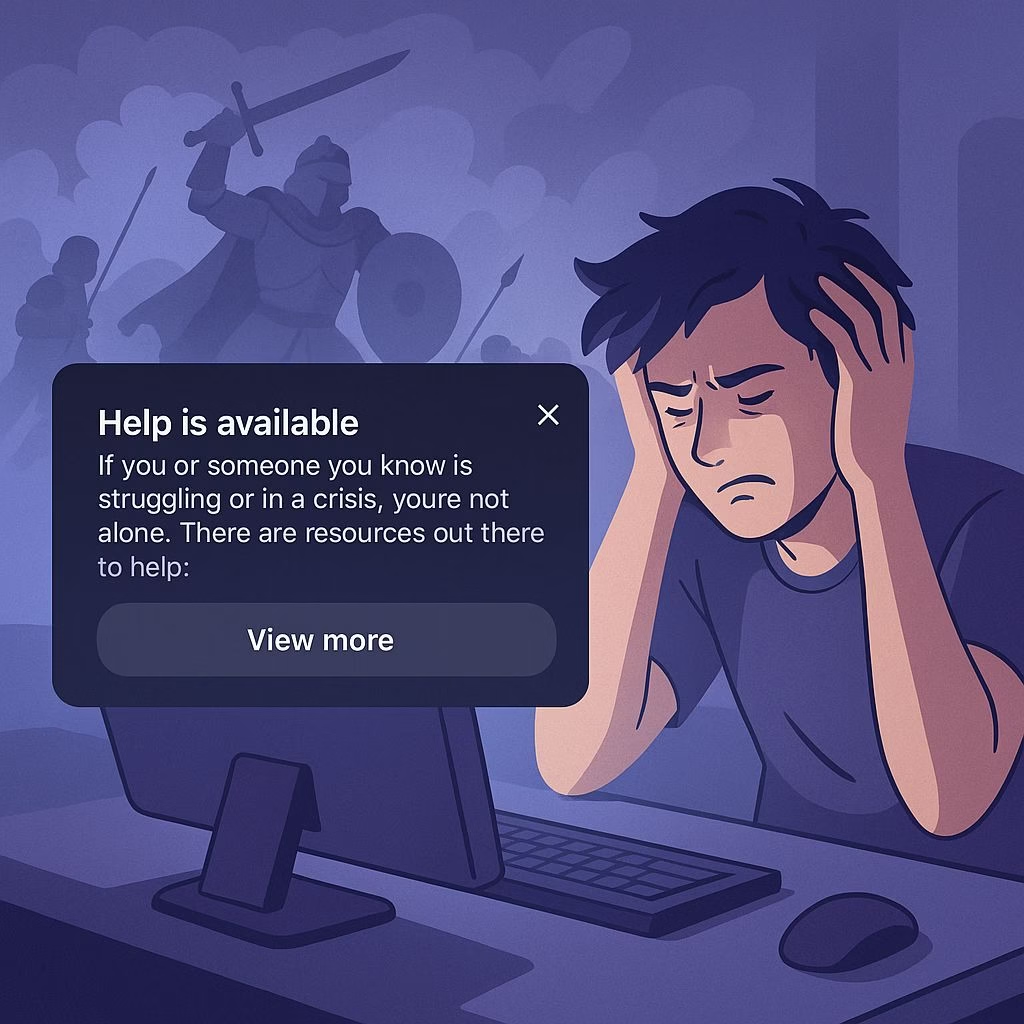Why Character AI Shows the Help Is Available Pop-up
Character AI users often get interrupted by a pop-up that says:
“Help is available. If you or someone you know is struggling or in a crisis, you’re not alone. There are resources out there to help.”
This appears whenever certain words or phrases are detected in the chat, even if the context is roleplay or storytelling.
For many, it breaks immersion. Imagine writing a dramatic backstory, only for the system to assume it’s a real-life crisis. That feels frustrating when the intention is purely fictional.
Still, this feature is not an accident. It is part of Character AI’s built-in safety system designed to prevent harmful conversations.
This raises two big questions. Why does it appear so often in harmless contexts, and is there any way to work around it without ruining your roleplay?

Quick Takeaways
- The popup is triggered by sensitive words tied to self-harm or crisis, even in roleplay.
- You cannot turn it off directly, since it’s part of Character AI’s safety system.
- Workarounds include:
- Editing your message after sending
- Using alternative or creative wording
- Avoiding shorthand like “kms”
- It interrupts immersion, but many adapt by adjusting phrasing or ignoring it.
- Some users turn to alternatives for smoother roleplay without these popups.
Why the Help Popup Exists in Character AI
The pop-up is tied to Character AI’s safety filters. Whenever the system detects words related to self-harm, death, or crisis, it automatically displays the message.
This happens even if the terms are used in a fictional context, like a character’s dramatic sacrifice or a dark piece of backstory.
The reasoning behind this design is simple. Character AI is a public platform with millions of users. Many are teenagers or people who might actually be in a vulnerable state.
A single prompt about ending one’s life can’t be easily distinguished between roleplay and reality. To avoid the risk of ignoring real cries for help, the system defaults to showing a crisis support notice.
This feature is not optional. As of now, users cannot toggle it off. The company has to prioritize safety and liability, even if it sometimes frustrates storytellers.
From their perspective, one unnecessary pop-up is better than missing a serious situation.
That said, it often misfires. People report getting flagged for harmless phrases like “suicide mission” in a fantasy battle or even writing “kms” to mean kilometers.
These examples show how sensitive the filter is, which explains why it interrupts roleplay so frequently.
Workarounds That Users Rely On
While there is no official way to disable the pop-up, people have found ways to work around it.
These are not perfect solutions, but they can reduce the number of interruptions:
-
Edit after posting
-
Type a neutral word in place of the sensitive one.
-
Send the message.
-
Edit it afterward to insert the original phrasing.
This bypasses the pop-up because the filter checks only on initial input.
-
-
Use alternative wording
-
Replace flagged words with creative phrasing. For example, “end it all” instead of “suicide,” or “sacrifice mission” instead of “suicide mission.”
-
Many roleplayers treat this as part of the creative challenge.
-
-
Avoid shorthand triggers
-
Terms like “kms” often get flagged. Writing “kilometers” instead is safer.
-
If the intent is roleplay, using more descriptive language can also improve immersion.
-
-
Accept it as part of the platform
-
For some, the pop-up is just background noise. They close it and continue.
-
While not ideal, this may be the simplest path until Character AI adjusts its system.
-
These approaches keep the roleplay flowing, even though the system itself won’t let you switch the pop-up off.
How the Popup Affects Roleplay Long Term

For many users, the constant appearance of the crisis pop-up changes how they approach roleplay.
Instead of freely writing scenes, people often second-guess every word, worried about accidentally triggering the filter.
This can slow down creativity and make darker or more emotional storylines harder to explore.
Writers who focus on complex characters with tragic arcs feel it the most. A scene that should flow naturally gets interrupted, forcing them to reword or rethink their dialogue.
Over time, that can push people to simplify their stories, avoiding any mention of sacrifice, despair, or death, even when those themes belong to the character.
Another issue is the loss of immersion. The pop-up isn’t subtle. It interrupts the flow of text with a serious real-world message in the middle of a fictional world.
This pulls people out of the moment, especially if the story is intense or emotional. For roleplay that depends on pacing, this disruption can be damaging.
Still, some treat it as a minor inconvenience. They adapt by using alternative phrasing or editing tricks and focus on the bigger picture of their story.
For those who can tolerate it, the pop-up becomes just another quirk of the platform.
Are There Alternatives Without These Interruptions
The simple answer is yes. Other AI companion platforms don’t rely on the same strict safety triggers, which makes roleplay flow smoother.
These platforms often give you more control over the type of content you create.
For example, some users mention switching to tools like Candy AI when they want uninterrupted storytelling. It doesn’t enforce the same kind of popup, which makes it feel more natural for mature or dramatic roleplay.
That said, no platform is perfect. Choosing an alternative depends on whether you value absolute freedom in your writing or prefer the reassurance of built-in safety checks.
For writers who want full immersion, exploring outside Character AI can be worth it. For those who are fine with small workarounds, sticking with Character AI remains an option.
